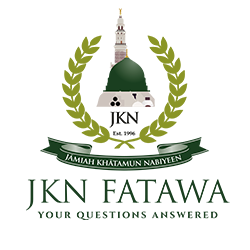7th December 2020
السلام عليكم و رحمة الله و بركاته
Question: Is one allowed to use CBD in infused skincare products or as drinking?
الجواب حامداً و مصلياً
In the name of Allāh, the Most Gracious, the Most Merciful
Answer: In reference to your query, CBD is one of many compounds, known as cannabinoids, that comes from cannabis plant. Cannabis plants are of two types, hemp plant and marijuana plant; each one cultivated for different purposes. Unlike the marijuana, hemp plant is grown for industrial use and not bred to produce intoxication such as THC.[1] The ruling on CBD products therefore depends on the type of product and its usage, in other words whether for external use such as cream or for drinking.
If CBD oil is consumed then the ruling depends on the level of Tetrahydrocannabinol (THC) is present or not. THC is an intoxicating element that makes one high.[2] If no THC is present or such negligible amounts that is not intoxicating then it is permissible to drink. If it does contain it to the degree that it makes one high then it will be haram to consume.[3] If there is a dire necessity and a Muslim doctor has advised to use this product and no other halal alternative medicine is present to the equal effect then the principle of dharurah will apply and thus permissible to consume.[4] It is important to note that if there is a halal alternative available then you cannot drink it.
If it is for external use such as creams and ointments then it will be permissible to use CBD infused skincare products even with THC because in this case you are not drinking it.
Note: Some evidences suggest that topical (external) application of THC to the skin may cause mild intoxication but not to the degree that causes high like oral intake. The ruling of intoxication is generally based on oral consumption (drinking) as opposed to external application. If on the account of piety a person wishes to refrain and just use CBD creams that don’t contain THC, then that is even better.
[Allāh Knows Best]
Written by: Apa Zulaikha Reviewed by: Mufti Abdul Waheed
Attested by: Shaykh Mufti Saiful Islam
JKN Fatawa Department
[1] See https://www.medicalnewstoday.com/articles/317221.php
[2] See, https://www.medicalnewstoday.com/articles/317221.php https://www.healthline.com/health/cbd-vs-thc and, https://cbdoilreview.org/cbd-cannabidiol/thc-cbd/
[3] Durrul Mukhtār wa Hashiyah Ibn Ābideen Shāmi, Kitābul Hadhar wa Ibaha, vol 6, page 754
ﻭﻳﺤﺮﻡ ﺃﻛﻞ اﻟﺒﻨﺞ ﻭاﻝﺣﺸﻴﺶﺓ(
(ﻗﻮﻟﻪ ﻭﻳﺤﺮﻡ ﺃﻛﻞ اﻟﺒﻨﺞ) ﻫﻮ ﺑﺎﻟﻔﺘﺢ: ﻧﺒﺎﺕ ﻳﺴﻤﻰ ﻓﻲ اﻟﻌﺮﺑﻴﺔ ﺷﻴﻜﺮاﻥ، ﻳﺼﺪﻉ ﻭﻳﺴﺒﺖ ﻭﻳﺨﻠﻂ اﻟﻌﻘﻞ ﻛﻤﺎ ﻓﻲ اﻟﺘﺬﻛﺮﺓ ﻟﻠﺸﻴﺦ ﺩاﻭﺩ. ﻭﺯاﺩ ﻓﻲ اﻟﻘﺎﻣﻮﺱ: ﻭﺃﺧﺒﺜﻪ اﻷﺣﻤﺮ ﺛﻢ اﻷﺳﻮﺩ ﻭﺃﺳﻠﻤﻪ اﻷﺑﻴﺾ، ﻭﻓﻴﻪ: اﻟﺴﺒﺖ ﻳﻮﻡ اﻷﺳﺒﻮﻉ، ﻭاﻟﺮﺟﻞ اﻟﻜﺜﻴﺮ اﻟﻨﻮﻡ، ﻭاﻟﻤﺴﺒﺖ: اﻟﺬﻱ ﻻ ﻳﺘﺤﺮﻙ. ﻭﻓﻲ اﻟﻘﻬﺴﺘﺎﻧﻲ: ﻫﻮ ﺃﺣﺪ ﻧﻮﻋﻲ ﺷﺠﺮ اﻟﻘﻨﺐ، ﺣﺮاﻡ ﻷﻧﻪ ﻳﺰﻳﻞ اﻟﻌﻘﻞ، ﻭﻋﻠﻴﻪ اﻟﻔﺘﻮﻯ، ﺑﺨﻼﻑ ﻧﻮﻉ ﺁﺧﺮ ﻣﻨﻪ ﻓﺈﻧﻪ ﻣﺒﺎﺡ ﻛﺎﻷﻓﻴﻮﻥ ﻷﻧﻪ ﻭﺇﻥ اﺧﺘﻞ اﻟﻌﻘﻞ ﺑﻪ ﻻ ﻳﺰﻭﻝ، ﻭﻋﻠﻴﻪ ﻳﺤﻤﻞ ﻣﺎ ﻓﻲ اﻟﻬﺪاﻳﺔ ﻭﻏﻴﺮﻫﺎ ﻣﻦ ﺇﺑﺎﺣﺔ اﻟﺒﻨﺞ ﻛﻤﺎ ﻓﻲ ﺷﺮﺡ اﻟﻠﺒﺎﺏ اﻩـ.
ﺃﻗﻮﻝ: ﻫﺬا ﻏﻴﺮ ﻇﺎﻫﺮ، ﻷﻥ ﻣﺎ ﻳﺨﻞ اﻟﻌﻘﻞ ﻻ ﻳﺠﻮﺯ ﺃﻳﻀﺎ ﺑﻼ ﺷﺒﻬﺔ ﻓﻜﻴﻒ ﻳﻘﺎﻝ ﺇﻧﻪ ﻣﺒﺎﺡ: ﺑﻞ اﻟﺼﻮاﺏ ﺃﻥ ﻣﺮاﺩ ﺻﺎﺣﺐ اﻟﻬﺪاﻳﺔ ﻭﻏﻴﺮﻩ ﺇﺑﺎﺣﺔ ﻗﻠﻴﻠﻪ ﻟﻠﺘﺪاﻭﻱ ﻭﻧﺤﻮﻩ ﻭﻣﻦ ﺻﺮﺡ ﺑﺤﺮﻣﺘﻪ ﺃﺭاﺩ ﺑﻪ اﻟﻘﺪﺭ اﻟﻤﺴﻜﺮ ﻣﻨﻪ، ﻳﺪﻝ ﻋﻠﻴﻪ ﻣﺎ ﻓﻲ ﻏﺎﻳﺔ اﻟﺒﻴﺎﻥ ﻋﻦ ﺷﺮﺡ ﺷﻴﺦ اﻹﺳﻼﻡ: ﺃﻛﻞ ﻗﻠﻴﻞ اﻟﺴﻘﻤﻮﻧﻴﺎ ﻭاﻟﺒﻨﺞ ﻣﺒﺎﺡ ﻟﻠﺘﺪاﻭﻱ، ﻣﺎ ﺯاﺩ ﻋﻠﻰ ﺫﻟﻚ ﺇﺫا ﻛﺎﻥ ﻳﻘﺘﻞ ﺃﻭ ﻳﺬﻫﺐ اﻟﻌﻘﻞ ﺣﺮاﻡ اﻩـ ﻓﻬﺬا ﺻﺮﻳﺢ ﻓﻴﻤﺎ ﻗﻠﻨﺎﻩ ﻣﺆﻳﺪ ﻟﻤﺎ ﺳﺒﻖ ﺑﺤﺜﻨﺎﻩ ﻣﻦ ﺗﺨﺼﻴﺺ ﻣﺎ ﻣﺮ ﻣﻦ ﺃﻥ ﻣﺎ ﺃﺳﻜﺮ ﻛﺜﻴﺮﻩ ﺣﺮﻡ ﻗﻠﻴﻠﻪ ﺑﺎﻟﻤﺎﺋﻌﺎﺕ، ﻭﻫﻜﺬا ﻳﻘﻮﻝ ﻓﻲ ﻏﻴﺮﻩ ﻣﻦ اﻷﺷﻴﺎء اﻟﺠﺎﻣﺪﺓ اﻟﻤﻀﺮﺓ ﻓﻲ اﻟﻌﻘﻞ ﺃﻭ ﻏﻴﺮﻩ، ﻳﺤﺮﻡ ﺗﻨﺎﻭﻝ اﻟﻘﺪﺭ اﻟﻤﻀﺮ ﻣﻨﻬﺎ ﺩﻭﻥ اﻟﻘﻠﻴﻞ اﻟﻨﺎﻓﻊ، ﻷﻥ ﺣﺮﻣﺘﻬﺎ ﻟﻴﺴﺖ ﻟﻌﻴﻨﻬﺎ ﺑﻞ ﻟﻀﺮﺭﻫﺎ. ﻭﻓﻲ ﺃﻭﻝ ﻃﻼﻕ اﻟﺒﺤﺮ: ﻣﻦ ﻏﺎﺏ ﻋﻘﻠﻪ ﺑﺎﻟﺒﻨﺞ ﻭاﻷﻓﻴﻮﻥ ﻳﻘﻊ ﻃﻼﻗﻪ ﺇﺫا اﺳﺘﻌﻤﻠﻪ ﻟﻠﻬﻮ ﻭﺇﺩﺧﺎﻝ اﻵﻓﺎﺕ ﻗﺼﺪا ﻟﻜﻮﻧﻪ
ﻣﻌﺼﻴﺔ، ﻭﺇﻥ ﻛﺎﻥ ﻟﻠﺘﺪاﻭﻱ ﻓﻼ ﻟﻌﺪﻣﻬﺎ، ﻛﺬا ﻓﻲ ﻓﺘﺢ اﻟﻘﺪﻳﺮ، ﻭﻫﻮ ﺻﺮﻳﺢ ﻓﻲ ﺣﺮﻣﺔ اﻟﺒﻨﺞ ﻭاﻷﻓﻴﻮﻥ ﻻ ﻟﻠﺪﻭاء. ﻭﻓﻲ اﻟﺒﺰاﺯﻳﺔ: ﻭاﻟﺘﻌﻠﻴﻞ ﻳﻨﺎﺩﻱ ﺑﺤﺮﻣﺘﻪ ﻻ ﻟﻠﺪﻭاء اﻩـ ﻛﻼﻡ اﻟﺒﺤﺮ. ﻭﺟﻌﻞ ﻓﻲ اﻟﻨﻬﺮ ﻫﺬا اﻟﺘﻔﺼﻴﻞ ﻫﻮ اﻟﺤﻖ
[4] Durrul Mukhtār wa Hashiyah Ibn Ābideen Shāmi, Kitābul Hadhar wa Ibaha, vol 1, page 210
فُرُوعٌ] اُخْتُلِفَ فِي التَّدَاوِي بِالْمُحَرَّمِ وَظَاهِرُ الْمَذْهَبِ الْمَنْعُ كَمَا فِي رَضَاعٍ الْبَحْرُ، لَكِنْ نَقَلَ الْمُصَنِّفُ ثَمَّةَ وَهُنَا عَنْ الْحَاوِي: وَقِيلَ يُرَخَّصُ إذَا عُلِمَ فِيهِ الشِّفَاءُ وَلَمْ يُعْلَمْ دَوَاءٌ آخَرُ كَمَا رُخِّصَ الْخَمْرُ لِلْعَطْشَانِ وَعَلَيْهِ الْفَتْوَى
مَطْلَبٌ فِي التَّدَاوِي بِالْمُحَرَّمِ (قَوْلُهُ اُخْتُلِفَ فِي التَّدَاوِي بِالْمُحَرَّمِ) فَفِي النِّهَايَةِ عَنْ الذَّخِيرَةِ يَجُوزُ إنْ عَلِمَ فِيهِ شِفَاءً وَلَمْ يَعْلَمْ دَوَاءً آخَرَ. وَفِي الْخَانِيَّةِ فِي مَعْنَى قَوْلِهِ – عَلَيْهِ الصَّلَاةُ وَالسَّلَامُ – «إنَّ اللَّهَ لَمْ يَجْعَلْ شِفَاءَكُمْ فِيمَا حَرَّمَ عَلَيْكُمْ» كَمَا رَوَاهُ الْبُخَارِيُّ أَنَّ مَا فِيهِ شِفَاءٌ لَا بَأْسَ بِهِ كَمَا يَحِلُّ الْخَمْرُ لِلْعَطْشَانِ فِي الضَّرُورَةِ،…….. وَلِذَا قَالَ وَالِدِي فِي شَرْحِ الدُّرَرِ: إنَّ قَوْلَهُ لَا لِلتَّدَاوِي مَحْمُولٌ عَلَى الْمَظْنُونِ وَإِلَّا فَجَوَازُهُ بِالْيَقِينِيِّ اتِّفَاقٌ كَمَا صَرَّحَ بِهِ فِي الْمُصَفَّى.
